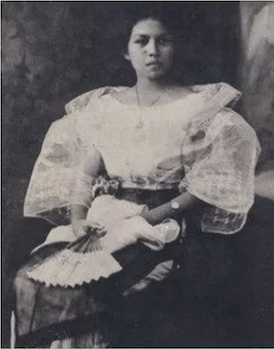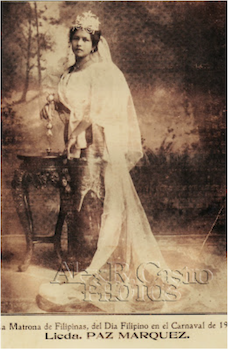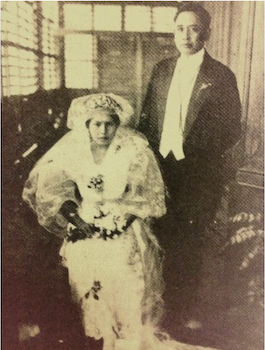
Living amid the Philippines’ American colonial period, Paz Márquez-Benítez wrote her way into history as a prominent short-story author, educator, and editor. Her contributions to the development of Filipino English literature have been a cornerstone in the industry, especially for women in professional careers. Moreover, her works focus on the effects and critique of American imperialism.
Márquez-Benítez was born on March 3, 1894, to the well-known Marquez Family in the Quezon Province of the Philippines. She was birthed into privilege both monetarily and educationally, as her exposure to academia at a young age began planting the seeds of her lifelong career. Paz’s father, Gregorio Marquez was educated at Ateneo de Manila University, and her mother, Maria Jurado was educated at the Escuela Municipal. However, sources are unclear as to whether or not her parents were in agriculture, education, or law as their field of work. Márquez-Benítez was the second of twelve siblings.
Impressively, Márquez-Benítez only began her education at age 6 but quickly transferred to high school by 8 in Tayabas National High School. Here, she was praised by her peers and teachers for her proficiency in English, to the point where it was said her English transcended her Spanish. Typical for families on the wealthier end of the spectrum, Márquez-Benítez was sent to the American boarding school, Philippine Normal University, where she was one of the first to be educated under an American system in the Philippines and thus became a bridge between the two cultures—a theme that regularly appears in her literary works.
After graduating high school in 1910, at around the age of 16, she attended the University of the Philippines where she eventually earned her Bachelor of Arts degree studying Liberal Arts in 1912. Notably, she was part of the first freshman class of the University of the Philippines, which now consistently stands as the top university in all of the Philippines.
From being captain of the basketball team to being named the national “Matrona de las Filipinas” beauty queen of the 1912 carnival for her beauty and brains, her youth involved various activities that showcased different cultural influences (both Western and southeastern) that were developing throughout the nation. It must be noted that she barely spoke and even denied her pageantry background, going as far as excluding her likeness from souvenir programs of the carnival. Furthermore, Márquez-Benítez struggled with her colonial upbringing and the association of whiteness with beauty, which diminished her confidence. Luckily she renounced this view at a later age and was able to grow into a more positive mindset.

In a remarkably short time after graduating from university, she started her tenure at the University of the Philippines from 1916-1951, teaching her self-developed short-story writing course and earning a reputation as an outstanding teacher and mentor. One of her students was National Artist Francisco Arcellana who said “She was the mother of us all!”.
Unfortunately, her more personal development from Liberal Arts to short-story writing is unknown to us due to a lack of publicly accessible texts of more personal writing such as diaries or letters.
In 1919, at the age of 25, she developed, founded, and edited one of the earliest women’s magazines in the Philippines called Women’s Journal. Moreover, in the same year, she founded the Philippines' first nonsectarian women’s college named Philippine Women’s College and later St John’s Academy, underscoring her dedicated support for women’s activism and participation in education and the workforce. Continuing in her career, she published her two most notable and impactful works Dead Stars and A Night in the Hills in the same year, 1925.
Dead Stars is considered the first Filipino English short story and follows Alfredo Salazar, a man engaged to a woman named Esperanza but finds himself infatuated with Julia Salas, the sister of his brother-in-law. The story shows the interactions between these three characters, following a relatively simple and linear prose style. The title Dead Stars means the ‘memories of the past’ since Alfredo can’t let go of the memories with Julia even after marriage. Similarly, the title Dead Stars could also represent the illusion of progress brought by American colonialism and the promise of the American dream.

When it was first published in the Philippines Herald, it was cited as the year English short stories in the Philippines “moved from the Age of Imitation to the Age of Adaptation and Experimentation”, effectively bringing Philippine literature to the mainstream.
After marrying fellow University of the Philippines alum, Francisco Benitez, they had four children Francisco Jr., Virginia, Roberto, and Vicente Rafael. Even as a mother and throughout retirement, she was able to take over her husband’s editing role after he died in the journal they founded together, The Philippine Journal of Education, for which she wrote 200 columns until 1977.
Unfortunately, Márquez-Benítez died on November 10, 1983, at the age of 89. No accessible source specifies her cause of death, but one can assume it was in Manila, Philippines amongst family and friends.
Her legacy is continued through various initiatives by academic institutions. One of which is Ateneo de Manila who hosts a Paz Marquez-Benitez Memorial Lecture every year to honor her legacy and highlight the contributions of Filipino women in literature. Also, an annual award from the same institution is given in her honour named the “Gawad Paz Marquez Benitez Award” to a nominated outstanding literature teacher.
Paz Márquez-Benitez touched women’s lives both indirectly and directly in equally meaningful and impactful ways. While inspiring one girl with her eloquent vocabulary on one end of the Philippines, another girl is discovering short-story writing at one of the colleges she founded on another. Through her devotion to English, and continued support for her students and women nationwide, she will be continually remembered as an influential figure. With her devotion to English, she has continually supported specifically women in academia.
Why Did I Choose to Research Paz Márquez-Benítez?
Through a turbulent era for the Philippines, she persevered in a field not familiar with women, and paved the way for future English writers to make their mark within literature in the Philippines.
My initial goal with joining iFeminist was getting in-touch with my culture, a culture I have not been an active part of in years, through its historical female icons. While searching for an appropriate article topic, I reflected on the thought that I had yet to read and analyse any sort of filipino-written literature. My search led to Paz Márquez-Benitez, a good entry-point into filipino-written literature for people less familiar with Filipino dialects and a woman who continues to inspire writers today.
Researching her has encouraged and inspired me to explore more of the literature the Philippines has to offer.
Works Cited
Ateneo Library of Women's Writings. (2006), The Major Collections Filipino Writers in English, Ateneo de Manila University, http://rizal.lib.admu.edu.ph/aliww/english_pmbenitez.html
Castro, A. (2008, September 14), 1912 Queen of the Manila Carnival PAZ JURADO MARQUEZ, https://manilacarnivals.blogspot.com/2008/09/21-1912-queen-of-manila-carnival-paz.html
Morales, C. (2023, March 3), 8 Interesting Facts You Should Know About Filipina Writer Paz https://www.8list.ph/who-is-paz-marquez-benitez/
Nicole Guiral, A. (2023, March 3), Paz Márquez-Benítez: the woman whose words led to a literary breakthrough, Tatler, https://www.tatlerasia.com/lifestyle/arts/paz-marquez-benitez
Roxas-Mendoza, P. (2023, April 6), Paz Marquez-Benitez: Between literature and history, Philippines Graphic, https://philippinesgraphic.com.ph/2023/04/06/paz-marquez-benitez-between-literature-and-history/
The Kahimyang Project. (2024, March 3), Today in Filipino history, March 3, 1894, Paz Marquez-Benitez was born in Lucena City, Quezon, Primo Esteria, https://kahimyang.com/kauswagan/articles/972/today-in-philippine-history-march-3-1894-paz-marquez-benitez-was-born-in-lucena-city-quezon
This article was published on 10/21/24